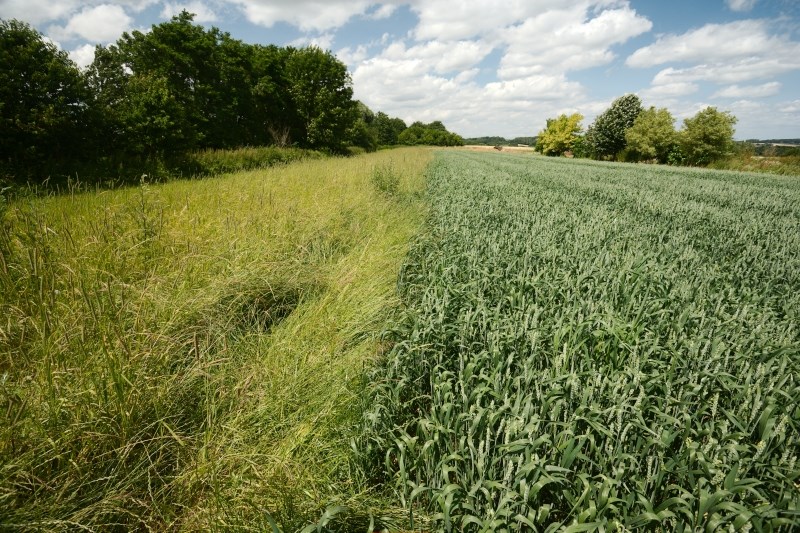‘Agriculture and Biodiversity’ programme

Botanically managed farmland border (photo Jeroen Mentens - Vildaphoto)
Details
...Despite all efforts, typical species of the agricultural area continue to decline. Elsewhere, in Flanders and even far beyond, biodiversity continues to decline. The EU Nature Restoration Law obliges us to monitor and restore biodiversity to scientifically substantiated satisfactory levels. The PAS also requires further efforts. The IPBES Transformative Change Assessment (2025) emphasises the need to address the underlying causes of biodiversity loss. The IPBES Nexus Assessment (2025) demonstrates the need for an integrated approach to biodiversity and food, among other things, which maximises synergies and minimises trade-offs.
Monitoring network: Building on our efforts in the Monitoring Network for Biodiversity in Agricultural Areas (MBAG), we provide objective and reliable scientific data on the state and trends of biodiversity in agricultural areas, in accordance with reporting obligations arising from the Nature Restoration Law. Specific focus is on farmland birds, wild pollinators and landscape elements with high diversity. The future of this monitoring network is being reviewed in the context of the priority setting and the Nature Restoration Act.
Positive practices: Agriculture faces major ecological, social and economic challenges. The need to rethink our food system and seek nature-based solutions is widely accepted. The European Biodiversity Strategy for 2030 refers to “transformative change”. There is still much debate about how this should be achieved. Through project development, INBO wants to focus on positive practices that benefit biodiversity, farmers, food production and public health. In consultation and cooperation with numerous partners, we are investigating how agro-ecological and other agricultural practices and nature restoration can reinforce each other. Management agreements and eco-schemes can be a lever in this process. These practices are also necessary to meet the objectives of the Nature Restoration Regulation, such as expanding highly diverse landscape elements in agricultural areas, halting the decline and restoring the agricultural bird index and wild pollinator populations to satisfactory levels. We are investigating how nature restoration can be achieved in a way that also benefits agricultural operations. To this end, we work closely with farmers and their organisations. We also collaborate intensively with ILVO and other scientific institutions, both in Belgium and abroad.
Policy support: INBO supports policy to better integrate biodiversity into agricultural, food and rural policy, with attention to the socio-economic context. We do this through recommendations, answering questions and participating in consultation forums (such as the Agricultural Research Platform, Atelier Voeding, Living Lab Agro-Ecology, etc.). We collaborate with Flemish entities on themes such as nature-inclusive agriculture and nature-based solutions, including through structural partnerships such as that with VLM.
| Status | Running |
|---|---|
| Actual start/end date | 04/09/2018 - 31/12/2029 |
Teams
- Nature & Society
- Management Team
- Biometry, Methodology and Quality Assurance
- Biotope Diversity
- Forest Ecology and - Management
- Landscape Ecology and Nature Management
- Species Diversity
- Datamanagement
- Estuaries
- Environment and Climate
- Freshwater Habitats
- Monitoring and Restoration of Aquatic Fauna
- Communication and Policy
- Ecohydrology
- BirdLab
- Species conservation
- Wildlife management & coexistence
INBO Research theme(s)
- Agriculture
- Data & infrastructure
Participants
Lieve VriensBart Vandevoorde
Veronique Adriaenssens
Emma Cartuyvels
Robbe Cool
Robin Daelemans
Steven De Saeger
Jonathan De Schrijver
Kris Decleer
Jomme Desair
Rémar Erens
Maria-Rose Eves Down
Johannes Jansen
Ward Langeraert
Mieke Lateir
Pieter Lemmens
Kevin Maebe
Dieter Mortelmans
Jo Packet
Karen Puttemans
Kurt Sannen
Thomas Scheppers
Amaury Sonneville
Toon Spanhove
Geert Spanoghe
Hans Van Calster
Sylvie Van Damme
Jelle Van Den Berghe
Sanne Van Donink
Gunther Van Ryckegem
Jeroen Vanden Borre
Kristine Vander Mijnsbrugge
Louise Vercruysse
Jan Wouters
Peter Van Gossum
Marc Pollet
Myriam Dumortier
Luc De Bruyn
Bruno De Vos
Koen Devos
Peter Van Gossum
